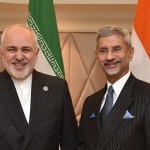The Iranian foreign minister’s first visit to Mumbai came just days after heightened tensions in the Persian Gulf between the U.S. and Iran. A sophisticated and flawless diplomat, Javad Zarif presented the Iranian side well.
But clearly, the killing of General Soleimani by the U.S. has rattled the region and, as Zarif said, created an unnecessary crisis. Indian experts on Iran say that while General Soleimani may evoke mixed feelings in his own constituency and with others outside Iran, certain facts remain: he brought peace to Afghanistan and Iraq, he fought against Saddam Hussein, and later ISIS. His popularity was evident from the outpouring of grief and the large crowds witnessed during his funeral. Iran responded with a missile attack on an Iraqi airbase, hosting U.S. service members, killing none, but it was adequate warning. Since then, the tensions have been reduced.
Who gains from the Soleimani death? The two biggest will be ISIS, against which General Soleimani was fighting, and China, to whom Iran will be driven for political and economic cover.
Iran’s attitude to the U.S. can be understood in light of the Joint Comprehensive Plan of Action (JCPOA) negotiations, under which Iran agreed to abandon its nuclear programme in return for sanctions being repealed. After agreeing to the deal, the U.S., under President Obama, first refused to remove its own sanctions on Iran, and then under President Trump, renewed the sanctions. This has brought enormous suffering to the average citizen, and U.S. behaviour has also destroyed the credibility of the moderates, who advocated dialogue, and strengthened hardliners within Iran.
The killing of General Soleimani has destroyed any chances of a future deal, which Iran needs, but can’t do under hardliner pressure. The likely result is that Iran will work on strengthening its politico-military levers, namely the Hamas, Hezbollah and Houthis, in an attempt to regain the leverage it had abandoned during the negotiations with the U.S.
There is also the possibility of a future miscalculation by any of Soleimani’s successors. General Soleimani was an established leader with nothing to prove. A successor, trying to establish his credentials, could step up the aggression.
Yet, Iran has civilisational patience. A retaliation, if it is to come, could take a year, or two. as Zarif pointed out in Mumbai, the Iranians are hardworking people, who have been “industrious for several millennia before America was discovered. We had an empire seven times the lifespan of America.” Instead, the U.S. is the upstart, which has “not forgiven us for dethroning the government they installed” in 1953.
However, Iran needs revenue. India’s stoppage of Iranian oil imports under U.S. sanctions is hurting the country. And even more galling for Zarif is that the “U.S. is the biggest producer of oil, and is trying to take Iran’s market in Asia, with more expensive and less reliable oil supplies,” he said.
To avoid U.S. sanctions altogether, Zarif proposed a barter trading system of commodities and services between India and Iran. For facilitating payments, the two countries are negotiating to set up branches of the Indian UCO Bank in Iran (including Chabahar) and Iran’s Pasargad Bank in Mumbai. However, this will not help restart the India-Iran oil trade, which is now halted. From being the third largest source of oil for India, imports from Iran have now dropped to zero. For the foreseeable future, India-Iran trade is set to remain confined to items not covered by sanctions: food products and medicines.
Amit Bhandari is Fellow, Energy & Environment Studies Programme, Gateway House
This blog was exclusively written for Gateway House: Indian Council on Global Relations. You can read more exclusive content here.
For interview requests with the author, or for permission to republish, please contact outreach@gatewayhouse.in
© Copyright 2020 Gateway House: Indian Council on Global Relations. All rights reserved. Any unauthorized copying or reproduction is strictly prohibited.


